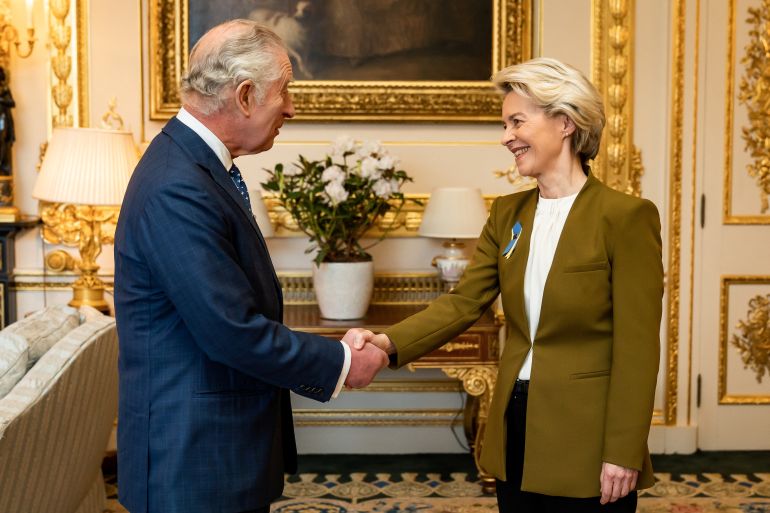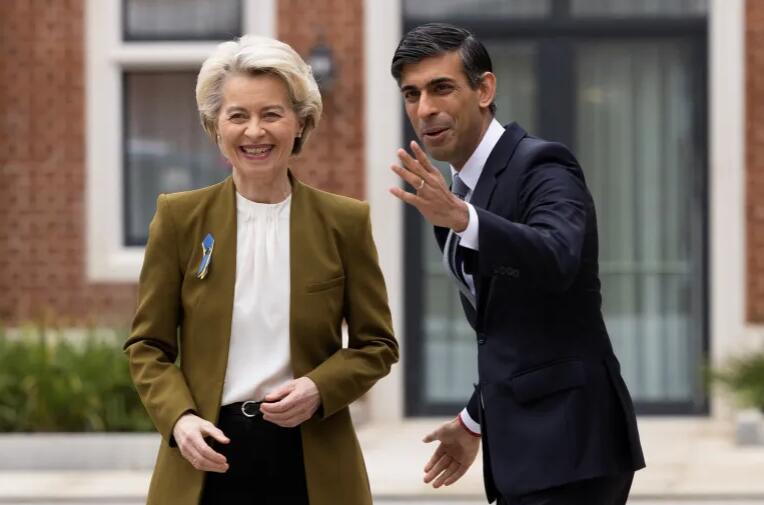The United Kingdom and the European Union have struck a new post-Brexit deal aimed at resolving their long-running trade dispute over Northern Ireland.
The agreement, which amends the controversial Northern Ireland Protocol, came after high-level talks on Monday in Windsor, just west of London, between UK Prime Minister Rishi Sunak and Ursula von der Leyen, the president of the European Commission.
“We have now made a decisive breakthrough, together we have changed the original protocol and are today announcing the new Windsor Framework,” Sunak said at a news conference alongside von der Leyen following the pair’s discussions.
“Today’s agreement delivers smooth-flowing trade within the whole of the United Kingdom, protects Northern Ireland’s place in our union and safeguards sovereignty for the people of Northern Ireland,” he added.
Von der Leyen praised the deal as “a practical solution for people and for all communities in Northern Ireland.
“This new framework will allow us to begin a new chapter,” she told reporters at the news conference.“It provides for long-lasting solutions that both of us are confident will work for all people and businesses in Northern Ireland – solutions that respond directly to the concerns they have raised.”
Sunak confirmed that Britain’s Parliament would get a vote on the agreement once there had been “time for people to digest” it, but hailed the breakthrough as the beginning of a new era in UK-EU relations.
“The United Kingdom and European Union may have had our differences in the past, but we are allies, trading partners and friends … this is the beginning of a new chapter in our relationship,” he said.
Political deadlock
The deal seeks to resolve tensions caused by the 2020 post-Brexit arrangements governing Northern Ireland, a British territory, and its open border with the Republic of Ireland, which is part of the EU. The issue has triggered the collapse of the regional government, shaken Northern Ireland’s decades-old peace process and soured ties between the UK and EU.
The new framework is expected to ease physical checks on goods flowing from other parts of the UK to Northern Ireland, and give the latter’s lawmakers a say over the EU rules it has to implement under the complicated terms of Britain’s exit from the bloc.
The leader of Northern Ireland’s Democratic Unionist Party (DUP), which withdrew from the territory’s power-sharing arrangements over the previous deal, on Monday said his party was now studying the legal texts setting out proposed new trading arrangements.
Jeffrey Donaldson said that in broad terms it was clear that significant progress had been secured across a number of areas on the trade rules for Northern Ireland but that key issues of concern remained.
“The DUP will want to study the detail of what has been published today as well as examining the detail of any and all underpinning legal texts. Where necessary we stand ready to engage with the government in order to seek further clarification, re-working or change as required,” Donaldson said in a statement.
“There can be no disguising the fact that in some sectors of our economy EU law remains applicable in Northern Ireland.”
The DUP has boycotted Northern Ireland’s regional assembly for the last year in protest at the post-Brexit checks between Britain and Northern Ireland, and Donaldson said on Monday that this “principled position” had been vindicated.
He said the party would assess the new arrangements against the “seven tests” it had drawn up during the negotiation and this would decide whether the deal “respects and restores Northern Ireland’s place within the United Kingdom.”
Al Jazeera’s Jonah Hull, reporting from London, said the “key pillars” of the agreement were the smoothing of trade between the UK mainland and Northern Ireland and the provision of an emergency mechanism – the so-called Stormont Brake – allowing Northern Ireland’s regional assembly to put an emergency block on EU laws applying there.
“The deal will provide for all foodstuffs available on shelves in the UK mainland to also be available in Northern Ireland shelves provided they are not going on for export deeper into the EU’s single market,” Hull said.
“The same goes for medicines, pets and plants – all of those things had been severely hampered by new [post-Brexit] checks under the Northern Ireland Protocol,” he added.
‘Long-lasting solutions’
The United States, which was closely involved in the so-called Good Friday Agreement that brought peace to the territory after some 30 years of sectarian conflict, hailed the deal as a chance to “improve prosperity” and cement peace.
The new arrangement is “an essential step to ensuring that the hard-earned peace and progress of the Belfast/Good Friday Agreement is preserved and strengthened,” US President Joe Biden said in a statement.
“I am confident the people and businesses of Northern Ireland will be able to take full advantage of the economic opportunities created by this stability and certainty.”
It remains to be seen whether the deal will be enough to satisfy critics in the rest of Britain, particularly on the right of Sunak’s Conservative party. Former Prime Minister Boris Johnson, who as leader at the time signed off on the trade rules that he now criticises, is widely believed to be manoeuvring for a comeback and could use the deal to undermine Sunak.
In a boost for Sunak’s chances of winning Conservative support, lawmaker Steve Baker — a self-styled “Brexit hardman” who helped topple Prime Minister Theresa May by opposing her Brexit deal in 2019 — said he was “delighted” with the agreement.
The European Research Group of pro-Brexit Conservative lawmakers said it would work with lawyers to examine the details before giving its verdict, a process that could take around a week.
David Davis, a former Brexit minister, said Sunak had pulled off a “formidable negotiating success”.
Business groups in Northern Ireland and the UK as a whole welcomed the new framework.
“Reaching an agreement is an important step in securing the stability and certainty businesses have been seeking,” said the Northern Ireland Business Brexit Working Group, a group representing all the main industries in Northern Ireland, including representatives for retailers, farmers, manufacturers and hauliers.
“It is our shared aspiration that the agreement will deliver a unique platform that unlocks economic growth and investment, but we will need time and space to work through the technical detail with our members.”

Tony Danker, who heads the Confederation of British Industry, said it would “allow businesses and politicians to turn their attention to economic growth and delivering greater prosperity.”
Von der Leyen later met King Charles III for an audience at Windsor Castle, despite some criticism from Unionists and other British politicians that it risked dragging the monarchy “into a hugely controversial political issue”. The two were set to discuss topics including climate change and the war in Ukraine.

